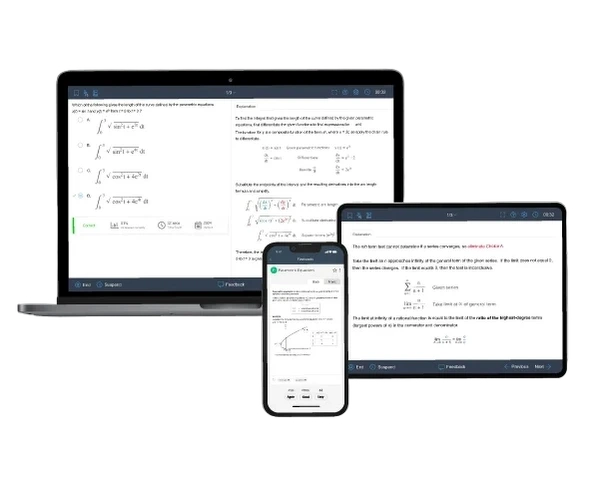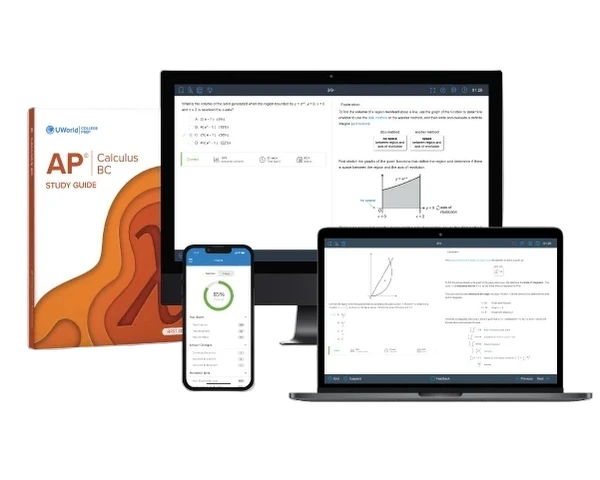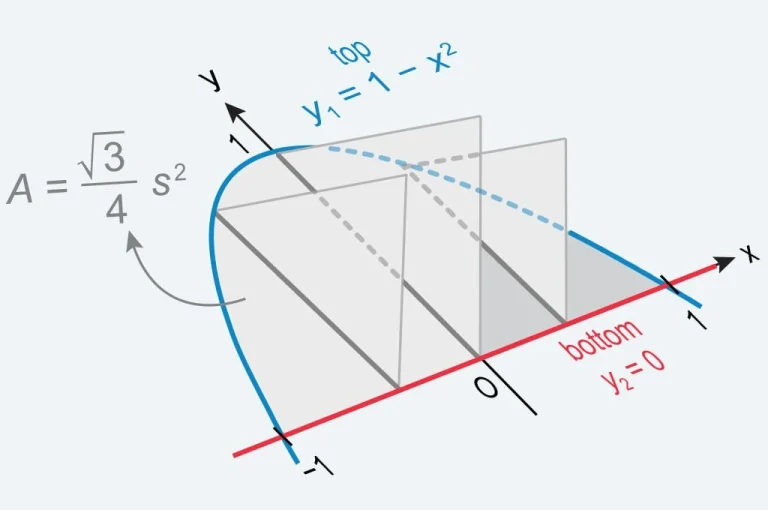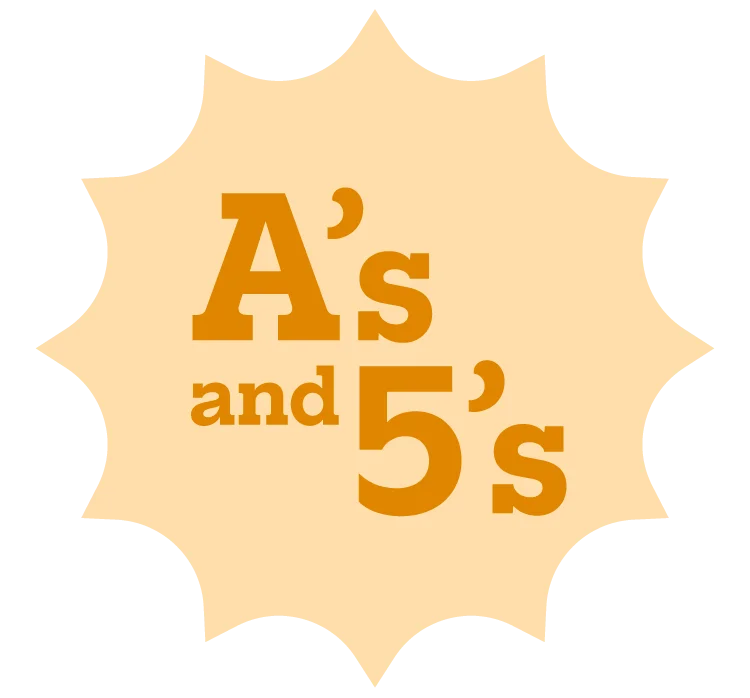The AP Calculus BC exam tends to have one of the highest pass rates of all AP exams, with about 80.9% of students achieving a score of 3 or above in 2024 — the third highest rank of all the AP course offerings that year. That doesn't mean the test is easy; many students who take AP Calc BC tend to be high performers in math, and some even take AB before BC.
The test can become substantially more manageable with the right preparation and resources. Whether you're aiming for a 3 to earn some college credit or a 5 to stand out on college applications, choosing our resources will help you prep smarter and more efficiently.
How To Study for the AP Calculus BC Exam
From the moment you enroll in an AP Calculus BC course to exam day, you can take the following steps to prepare and improve your chances of achieving your dream score.
How to Prepare for an AP Calculus BC Class
It's spring, and you've signed up to take an AP Calculus BC class next year. What now? Here are some things you can do before the school year starts to hit the ground running:
-
Begin preparing for the course before summer.
-
Review the AP Calculus BC Units, Topics & Key concepts.
-
If possible, talk to your AP Calculus BC teacher about the expectations of the class. It may also be a good idea to speak with your guidance counselor about the difficulty of the AP Calc BC course.
-
Brush up on algebra and pre-calculus concepts. Specifically, focus on functions and graphs, rational functions, limits, trigonometry and the unit circle, factoring polynomials and completing the square, exponent and logarithm rules, and working with e and natural logarithms.
-
Review formulas from geometry, such as the areas of circles, triangles, rectangles, and trapezoids. The volume and surface area of common 3D shapes like cubes, spheres, cylinders, and cones also appear occasionally, but College Board® will often provide formulas in a question stem when applicable.
-
Study AP Calculus BC Unit 1 concepts and practice some UWorld questions on limits. Paul's online math notes are an excellent, free resource for getting started with calculus and reviewing some pre-calculus topics.
-
Identify the ideal learning strategy for you — how do you best absorb information? Reading? Reading while taking notes? Watching videos? Practicing problems? A combination of these? Summer is a great time to figure this out.
How to Pass an AP Calculus BC Class
Two-thirds of the AP Calculus BC exam covers AB topics. If you're looking to pass with a 3 or higher, it is essential that you know the basics very well. That means being very proficient in derivatives and integrals. Knowing how to differentiate and integrate various kinds of functions is key to doing well in AP Calc BC.
Practice with UWorld questions in Topics 2.5–2.10 and 3.1–3.2 for derivatives, and Unit 6 for integrals. For more advanced practice with these concepts, try Units 4 and 8 to apply derivatives and integrals in context. Many of these concepts extend to Units 9 and 10, so they will also help you with the BC-exclusive topics.
Here are some tips for passing the AP Calculus BC exam:
- Practice at least 30 minutes a day, every day.
- Put effort into your homework. That's where you build your skills. Besides, teachers are more likely to work with a student and help them improve if they see consistent effort.
- Make flashcards for basic derivative and integral rules and use them regularly until you have them memorized.
- Get additional practice with our multiple-choice questions (MCQs). Focus on practicing derivatives and integrals, especially the chain rule and u-substitution. Only when you have the basics down should you spend some time on the other units.
- Practice free-response questions (FRQs) from the College Board's past years' exams. Analyze the scoring guidelines to understand what the College Board expects. If you have access to AP Classroom, it is also a good source of FRQs.
- Spend some time revisiting early units. The material from the beginning of the year might feel somewhat rusty by now.
- Two weeks before the exam, increase your study time to 1 hour per day, reviewing 2 units each day.
- Ask the teacher for help and suggestions on how to improve. They may be able to help you identify specific areas for growth.
How to Do Well on the AP Calculus BC Exam
If you are confident in your ability to master the basics and want to aim for a 4 or 5, you'll want to spend more time working with the BC-exclusive topics. Units 6 (advanced integration techniques), 9, and 10 should be your focus. Practice FRQs frequently using the College Board's previous years' questions. They include many similar question types in their FRQs, so pay attention to patterns.
For example, every test since 2012 (with the possible exception of 2020, for which the College Board has not released FRQs) has included 1 FRQ on Taylor/Maclaurin series. Practice those types of questions so you know how to handle them, as you will most likely see one on the test.
Here are some tips to improve your score from 3 to 4:
- Increase practice time to 45 minutes every day.
- Put effort into your homework.
- Review your notes from that day and the previous day's class every day after school. Concepts often connect, so reviewing the previous class's material can help you understand the next one.
- Around Spring Break, create a study plan for reviewing the course content (see below).
- Continue practicing MCQs with UWorld's AP Calculus BC practice test qbank.
- Practice FRQs with AP Classroom and those provided by College Board. Keep an eye out for commonly asked questions and focus on them.
- Increase studying time to 1.5 hours a day one month before the exam.
- Ask your teacher for help and suggestions on how to improve. They will help you and may even point out potential areas of improvement.
How to Score a Perfect 5 on the AP Calculus BC Exam
The most important thing to understand if you want to score a 5 is that you do not need to get every single point on the exam. You don't even need to achieve 90%, which is the requirement for an A in the U.S. school system. You typically need just about two-thirds of the total possible points to achieve a 5. Mistakes are inevitable on the AP Calculus BC exam, but are OK.
According to the College Board, 47.7% of the 148,191 test-takers scored a 5 on the 2024 AP Calculus BC exam.
Don't try to be perfect. Focus on maximizing your points in the areas you know well, and on anything else, try to eliminate answer choices and make an educated guess if it's taking too long.
Knowing where to spend your study time is vital. Make sure you spend a lot of time on major concepts and know which concepts aren't essential. For example, the derivative of inverse functions appears consistently in one MCQ per test but never (as far as we know) in an FRQ. One MCQ is not worth much, so if you're struggling to remember the formula, practice a few UWorld questions and create a flashcard with the formula to quiz yourself occasionally, but don't spend too much time on it. Focusing on more critical concepts will make a bigger difference.
Here are some tips to help you earn that coveted 5:
- Be prepared to practice for 45 to 60 minutes each day.
- Put in effort on your homework.
- Create flashcards for derivative and integral rules, common formulas, conditions, and conclusions of theorems, etc.
- Around spring break, create a study plan for reviewing the course content.
- Continue to use our AP Calculus BC question bank for MCQ practice.
- Keep practicing FRQs with AP Classroom and those provided by the College Board. Look for commonly asked questions and focus on them.
- Identify and track the concepts you struggle with. Consider asking your teacher for extra clarification on those topics, and practice more problems in those areas.
- Ask your teacher for suggestions on how to improve and identify specific areas for growth.
By spring break:
- Create a study plan for yourself.
- Increase study time to 1.5 to 2 hours per day.
- Time yourself on FRQs based on the timing of each section of the exam. If you find yourself running out of time, identify the concepts and question types that take you the longest and focus on those. If you have extra time, get in the habit of checking your work. See our AP Calculus BC FRQ guide for more tips.
- Review the FRQ scoring guidelines on the College Board's website to understand what they look for when grading. Pay particular attention to the 2024 guidelines as they detail exactly what the graders are looking for.
- Consider purchasing an exam prep book with additional sample problems if you've completed our AP Calculus BC question bank or all of the FRQs provided by the College Board.

Which Units Are the Most Difficult to Learn?
In the 2024 AP Calculus BC exam, students found free-response question 6 particularly challenging, with an average score of 3.38 out of 9. This question focused on Taylor and Maclaurin series, indicating that these topics were among the most difficult for test-takers.
Given this, it's crucial to thoroughly understand Taylor and Maclaurin series, including their structures and how to determine individual coefficients for each term. Additionally, practicing problems related to these series can enhance your proficiency and confidence in handling such questions on the exam.
Another key unit to focus on is Unit 9. BC students also struggle with this unit in MCQs and FRQs. Make sure you study formulas related to this and other crucial units for the AP Calculus BC exam.
UWorld's AP Calculus team also identifies polar coordinates in Unit 9 as a topic that gives BC students a lot of trouble. There are many different types of questions that can come in a polar package, but spend significant time looking at polar areas. The limits of integration in the polar area integrals are values of the angle ϴ instead of x or y, so it is important to think about how area accumulates as the function rotates about the origin and not as the function travels along an axis.
Another concept to emphasize is the advanced integral techniques introduced in Unit 6 that are exclusive to AP Calculus BC. Integration by parts and partial fractions are crucial tools to add to your integration toolkit that will help with questions in later units as well.
How to Self-Study for the AP Calculus BC Exam
If you plan to self-study for the AP Calculus BC exam without taking an AP class, you may face a few more obstacles and challenges. However, it is definitely doable. The biggest challenge will be the lack of a teacher to introduce concepts and help you improve. Your first step is to identify which learning style works best for you:
- Do you learn best from practice problems?
Subscribe to a question bank. Ours will help you learn from mistakes with the performance tracker feature. Take a few practice tests to monitor your progress and improve in those areas with the help of in-depth explanations.
- Do you learn best from watching videos or visual presentations?
Use our resources to build your skills and understanding if you prefer audio-visual media for learning.
- Do you learn best from reading a textbook and taking notes?
A valuable free resource is Paul's Online Math Notes. Although these notes are from a college professor and not specifically geared toward AP, they can be a good starting point. You could get a single-variable calculus textbook designed specifically for AP Calculus to help you with the coursework.
Most students learn from a combination of these approaches, so try different methods and see what works best for you. Our recommendation would be to incorporate all of them. Here's a general flow you can use to facilitate your learning process:
- Watch a video on a topic and take notes.
- If you use Khan Academy, the videos are short enough that you can watch 2 or 3 at once. They are well-organized for proper pacing.
- If you use Professor Leonard, the videos are lengthy, so segment them into multiple viewing sessions. He stitches together multiple lectures into one video, so consider watching until it cuts to the next lecture (his clothes will be different).
- Rewatch parts of or the entire video if the topic still isn't clear, or watch a similar video from another source. Sometimes, hearing or seeing a concept presented in multiple ways can help clarify confusion.
- Read a text explanation of the topic (textbook, Paul's, or other) and add it to your notes.
- Work on practice problems related to the topic (UWorld, Khan, textbook, Paul's, or other).
- If you use UWorld, read through the explanations, especially for the questions you answer incorrectly. We also include hyperlinks to general explanations of concepts or alternate/more detailed solutions, so we encourage you to explore those as well.
- If you use Khan Academy for videos, take their progress checks and quizzes along the way to help cement the ideas. They are generally not AP-level questions but are great when first learning a topic.
- Review your notes at the end of your study session.
This flow may or may not work for you. Experiment to determine which elements to incorporate into your study plan. See the next section for tips on creating a study plan that's right for you.
AP Calculus BC Study Schedule and Exam Tips
Now it's spring break or later, and it's time for the final push. No matter your time frame, we've got some tips to help you prepare for the AP Calculus BC exam.
In the best-case scenario, you should start buckling down around Spring Break. If you've been feeling stressed out by the rigor of an AP schedule, take a few days off or the whole week to relax. Not getting overwhelmed is very important for succeeding on the exam.
Now let's get started! For the first month or so leading up to the exam, spend some time reviewing specific units. Start with Unit 1 and work your way through the course material. Review your notes, take some practice questions on each topic, and take note of the areas that give you trouble. Questions in your textbook can be great for skill-building if you need a refresher on main concepts. Use UWorld MCQs and College Board FRQs for exam-level questions.
If you have access to AP Classroom, you may ask your teacher to provide you with some questions to practice. If you haven't already, create flashcards for key formulas and rules. Here's a guideline for how much time to spend on each part of the course:
- Limits and Derivatives (Units 1–5): 1.5 weeks
- Integrals (Units 6–8): 1.5 weeks
- Parametric Functions, Vectors, and Polar Coordinates (Unit 9): 0.5 weeks
- Infinite Series (Unit 10): 1.5 weeks
That leaves about 3 weeks until your exam date. Here's how you should spend that time:
- Take some time to review the concepts that gave you trouble during your unit review. Practice some more MCQs on those topics until you feel more confident.
- Now that you've targeted each individual unit, start mixing MCQs from multiple units. UWorld and AP Classroom both do this easily and intuitively.
- Use your flashcards daily to make sure you have the formulas down.
- Start timing your MCQs. The non-calculator section averages two minutes per question, and the calculator section averages three minutes per question. Some questions will take significantly more time than others, but try to get close to those averages. Check out our AP Calculus BC online course, featuring engaging videos, expert-designed practice questions, and an illustrated study guide, to boost your performance.
- For FRQs, start taking entire sections from past years' FRQs and time yourself on those.
Another thing to consider in your study schedule is your other AP courses, if you have any. Make sure your schedule accounts for all of them. For example, if you are taking 4 AP classes this school year, you might devote half an hour to each on weeknights and a couple of hours each on Saturdays. Find a schedule that allows you to spend enough time on each subject, and make sure you incorporate your other AP exam dates into your study schedule to prioritize accordingly. Similarly, adjust your schedule around extracurricular activities and sports. Planning ahead is key.
One final important bit of advice: incorporate breaks into your study schedule. It may seem like you don't have time to take a day off, but you will learn and absorb information much better if you're well-rested. Take some time away from the material periodically to do something fun or completely unrelated. Either set a regular day each week when you don't study or learn to recognize when you're feeling burned out and take the afternoon off.
If you only have 1 month until the exam, you still have a good amount of time to prepare. Like in the two-month schedule, you'll want to start with a general review of the course topics, unit by unit, but at a much quicker pace. Use your textbook and class notes if you need refreshers on the concepts, but spend most of your time solving textbook problems or our question bank.
With UWorld, you can review the answer explanations for questions you miss and spend less time on the explanations for questions you understand. This approach of targeting the concepts you need most saves you time. Here's a general breakdown of the timeframe:
-
Limits and Derivatives (Units 1–5): 0.5 weeks
-
Integrals (Units 6–8): 1 week (with extra emphasis on BC-exclusive topics)
-
Parametric Functions, Vectors, and Polar Coordinates (Unit 9): 0.5 weeks
-
Infinite Series (Unit 10): 1 week
For the remaining week, alternate between drilling through questions from all units in UWorld and practicing FRQs. Time yourself on the FRQs to make sure you can pace yourself well, and if you consistently have time left over, spend that time reviewing your work.
With a 2-week schedule, time is much more limited. In the first week, practice a few UWorld MCQs on each topic to identify problem areas, read through the explanations, and review your class notes in those areas.
In the second week, spend most of your time practicing FRQs. FRQs cover many topics simultaneously, making them a very time-efficient way to practice the course material. They also often require you to show your steps, making them an excellent way to emphasize the entire process of answering calculus questions.

AP Calculus BC Study Materials
Finally, here is a collection of materials you can use to facilitate your study. Most of these links are scattered throughout this guide, but we've compiled them in 1 section for your convenience.
Question Banks and Practice Problems
- UWorld: AP-level MCQs with in-depth explanations that help you learn from your mistakes.
- Paul's Online Math Notes: Provides valuable text on concepts and several practice problems for each topic.
- AP Classroom: Direct from the College Board, this resource includes actual past AP test questions but requires a teacher to assign tasks to students.
- College Board FRQs: FRQs from past exams that offer excellent practice for those sections.
Video Content
- Professor Leonard: A series of college lecture videos where he breaks down concepts and emphasizes the core ideas behind calculus.
Good luck, and happy studying!
References
- (2024). AP® Calculus BC Scoring Statistics 2024 Free-Response Questions. AP Central. College Board. Retrieved on February 13, 2025 from https://apcentral.collegeboard.org/media/pdf/ap24-calculus-bc-scoring-statistics.pdf
- (2024). Past AP Calculus BC Score Distributions. AP Students. College Board. Retrieved on February 13, 2025 from https://apstudents.collegeboard.org/about-ap-scores/score-distributions/ap-calculus-bc
AP Calculus BC Related Topics
Having trouble keeping up with FRQs in AP Calculus BC? Check out our guide on how to approach each question type in the free-response section.
How to Approach AP Calculus BC MCQsWant to score high on the AP Calculus MCQ section? Discover more with our comprehensive guide to approaching MCQ questions with ease.
AP Calculus BC Formula SheetOverwhelmed by formulas in AP Calc BC? Check out our AP Calculus BC formula sheet, where we list all formulas and make them easy to remember.
Best AP Calculus BC Study Guide ComparisonDiscover expert insights into Kaplan, Barron's, Princeton Review, and UWorld. Learn how each resource compares to help you choose the best fit.
Best AP Calculus BC Prep Course ReviewSearching for top AP Calculus BC prep courses? Read this review to compare the best courses and choose the perfect one for your success.
How to Self-Study for AP Calculus BCWant to ace AP Calculus BC on your own? Follow this expert self-study guide with tips, tricks, and tools to prepare effectively for the exam.




